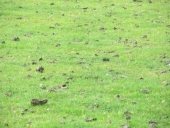Hi Daron--I am in Olympia and have an acre of pasture probably a lot like this. Are you new to this property? Mine hasn't been grazed in a couple years now and I haven't cut it since I moved here over 10 years ago. However, even though you can barely walk through it in the summer, and mine is being colonized by Canadian thistle, it will die back down over the winter. At least that is what happens on my pasture--it stops growing, the fruiting stalks fall over and the mild wet winter causes all to biodegrade. Planting for me is near impossible in the summer or fall in the pasture, but not in the early spring when the grass has not begun growing again. I have lots of deer too and most of my trees and raised bed areas, berry hedges, etc. are caged due to deer--I like the deer so put up with the occasional loss--sometimes it takes a sense of humor more than anything. I had some Soay sheep and, like goats, they love Himalayan blackberry, and Scotch broom, trailing buttercup, etc. but they are worse than deer when it comes to fruit trees. They are more primitive sheep. The animals I am hoping to sometime have for grazing are small-to-medium size geese (Shetlands) and Kune Kune pigs. Neither are hard on fruit trees or fences. As far as I can tell, I have to scythe/mow two times a summer to exhaust the Canadian thistle and I was going to buy a scythe for next spring. I'd love to hear your fencing idea as I'm always up for new ones! I'm currently in Arcata, CA right now and coming back to Olympia in a few weeks. I'm going to be pretty busy for a while getting the well pump replaced and such, but it sounds like we have similar challenges and could share ideas and experiments. I tried laying some old carpet on a portion and the result was wonderful shelter for a lot of voles

I haven't had any problem with them though. My pasture is the worst grass and I'd like to improve it too but it seems almost a necessity to have critters helping to eat it! I've been planting fruit and nut trees, vines, shrubs--wildlife habitat and food for me. I am also hoping to have ducks soon--Ancona ducks can produce more eggs than chickens, eat slugs, love this weather, and I think are even hardier than chickens. You can't beat something that eats slugs and produces such tasty protein. I'll be doing a lot of planting this coming winter/spring too. Would be happy to meet up sometime and check out our pasture situations.
































 1
1




 I haven't had any problem with them though. My pasture is the worst grass and I'd like to improve it too but it seems almost a necessity to have critters helping to eat it! I've been planting fruit and nut trees, vines, shrubs--wildlife habitat and food for me. I am also hoping to have ducks soon--Ancona ducks can produce more eggs than chickens, eat slugs, love this weather, and I think are even hardier than chickens. You can't beat something that eats slugs and produces such tasty protein. I'll be doing a lot of planting this coming winter/spring too. Would be happy to meet up sometime and check out our pasture situations.
I haven't had any problem with them though. My pasture is the worst grass and I'd like to improve it too but it seems almost a necessity to have critters helping to eat it! I've been planting fruit and nut trees, vines, shrubs--wildlife habitat and food for me. I am also hoping to have ducks soon--Ancona ducks can produce more eggs than chickens, eat slugs, love this weather, and I think are even hardier than chickens. You can't beat something that eats slugs and produces such tasty protein. I'll be doing a lot of planting this coming winter/spring too. Would be happy to meet up sometime and check out our pasture situations. 



